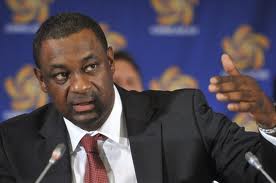By Andrew Warshaw
September 13 – FIFA’s recently established anti-discrimination Task Force will not get involved in the furore over 2018 World Cup host Russia’s controversial so-called anti-gay legislation. The task force, meeting in Zurich yesterday, has identified a series of key priorities including allocation of resources, a best practice manual and identification of high risk games.
“This is not a battle of football, but of human kind,” said anti-discrimination Task Force boss Jeffrey Webb.
FIFA has asked the Russians for further clarification about the legislation and Webb says his panel will leave the issue to the FIFA administration. “We have been advised that the FIFA administration, the president and secretary general, are in discussions with the Russian authorities,” Webb told reporters following the panel’s six-hour session.
“Whatever we do as a task force has to have the universality of the 209 (nation) membership of FIFA,” added Webb, a FIFA vice president and also President of CONCACAF. “If there is an infringement in regard to the FIFA statutes, that is for the FIFA disciplinary bodies and the FIFA executive committee to address.”
In July, Russia’s President Vladimir Putin signed off a law that imposes a maximum fine of 1 million rubles ($30,200) on “propaganda of non-traditional sexual relations” among minors. Foreign citizens charged under the law face 15 days in jail and deportation. Russia’s sports minister Vitaly Mutko, who is also head of the country’s 2018 World Cup organising committee, has accused western media of overplaying the issue, which has caused such a furore among athletes, officials, politicians and activists.
Thursday’s meeting was the second for the task force, which in May pushed through a series of recommendations for tougher sanctions following a growing number of football-related racist incidents.
Promoting a global campaign using players as ambassadors is planned for its next scheduled meeting in December.
“FIFA of course cannot address the issues for society as a whole but I think FIFA can definitely address it internally with coaches, players, clubs and stadiums,” Webb said.
During this week’s session, deliberations focused on actions to be implemented following the resolution on the fight against racism and discrimination approved at the FIFA Congress in Mauritius.
“It’s not only up to FIFA to implement the key decisions adopted by the Congress with regard to the fight against discrimination and racism. The implementation process needs to be fully supported by all member associations and society as a whole,” said Webb during the actual session.
The group identified the following matters as key priorities:
– Allocation of specific resources for the fight against racism and discrimination,
– Development of an anti-discrimination handbook to be provided to all Member Associations for best practice and training,
– Identification, recruitment and training of anti-discrimination officers,
– Identification of high-risk games,
– Identification and engagement of anti-discrimination ambassadors,
– Proposal of special award for achievements in the area of anti-discrimination.
Contact the writer of this story at moc.l1744382268labto1744382268ofdlr1744382268owedi1744382268sni@w1744382268ahsra1744382268w.wer1744382268dna1744382268
